Tom Kepler's Blog, page 5
October 16, 2020
Covid in the Family? "Grandpa's Gone Camping" Is the Last Line of Defense

During the last six weeks, I've been camping for four weeks--two at the beginning, then two weeks at home, and now just finishing up the last two weeks. The reason for these stints of camping certainly is in part because fall camping is so exciting, with the colors and the weather variations. However, there's another aspect of my time in camp that is not just about fun, and it's related to COVID-19.
At some point in late summer as our two grandkids and their parents were gearing up for school to start, my wife and I asked ourselves the question, "What if the kids go back to school, catch covid, bring it home, and then their parents and us both get sick. Who takes care of the kids?"
We distanced ourselves from our grandkids (ages 7 and 5) and their parents, just to see how school went. Classes were based on a hybrid model of part time at school with a 50/50 blend of smaller classes and schooling at home. It went pretty well, and my wife and I felt that the situation was about as safe as realistically possible. Therefore we began seeing the kids again, with time outside at the park and by wearing masks when we were in closer quarters.
The school circulated a survey of parents, and based on information gathered decided to go back to full-time in-class teaching, following the wishes of the majority of the parents. The school had been getting a great deal of pressure from parents to take the kids all day long so that parents could return to work. The economic pressure on parents was undeniable, and the chaos of politics infiltrating health policy on the state and federal levels with its resultant weakening of guidelines was also undeniable.
Therefore, I went camping again for another two weeks, my wife coming up to camp with me on weekends, and while at home my wife once again not visiting the grandkids. After just under two weeks of school, the grandkids' mom was contacted and told that our seven-year-old grandson had been in contact in the lunchroom with another student who had been tested and verified to have COVID-19. The kids and grandkids were told to stay at home in quarantine. My, who had met the day of the phone call with her daughter, also needed to be in quarantine.
My wife called that night while I was still at the state park, telling me the situation was exactly as we had logicked out earlier and feared would happen, based on how the state of Iowa had adulterated its health policies with political measures. Out of the four of us--parents and grandparents--I was the only one who was without a doubt not exposed. Fortunately, the next day our grandson was tested and found negative. He received a note that he could go back to school and the parents wouldn't have to quarantine.
My wife brought up the point that sometimes there is a false negative. What if that was true? We were back to our original question of what if all the adults get sick. Who will take care of the children?
My wife decided (and, of course, I agreed) that we two grandparents should extend our quarantine for a bit longer, my wife from her daughter and family, and me from my wife. That way just in case someone falls ill from this situation, perhaps my wife won't get ill and can mask up and assist if needed . . . and if my wife gets sick, then I can be the last grandpa standing, there to care for everyone as best I can. The irony, of course, is that Grandma and Grandpa are in the most vulnerable group, regarding the virus.
Desperate situations are possible in any medical crisis such as this, but when we see cut-offs for distance instruction set at levels above those suggested by health professionals, when we see modes of instruction determined by surveys rather than the best medical advice, when we see state infection rates used that may very well be inaccurate, then my wife and I and our children feel isolated in our danger, not supported and protected by our government.
We need to end this arrogant disregard for science. We need to end this placing of political agenda over people. We need to end the spread of disinformation and conspiracy theories. Lincoln said, "A house divided against itself cannot stand." I sit now alone in my tiny trailer, writing these words. A cold wind is blowing outside off the lake, rocking the trailer. From where I sit, cooperation and unity seem pretty darn desirable. "Every man for himself," now that Grandpa is the last man standing, seems a bleak and tragic possibility that I hope myself, my family, and my nation can avoid.

Enter your email address:
Delivered by FeedBurner

October 9, 2020
Reading Emerson's Essay "Nature" While Camping
 "Landscape and Transcendence," Jasper Francis Cropsey (1823-1900)
"Landscape and Transcendence," Jasper Francis Cropsey (1823-1900)
In his essay "Nature," Ralph Waldo Emerson says this about being outside during times "wherein the world reaches its perfection," speaking specifically about October: "These halcyons [days of peace and tranquillity] may be looked for with a little more assurance in that pure October weather, which we distinguish by the name of Indian Summer. The day, immeasurably long, sleeps over the broad hills and warm wide fields. To have lived through all its sunny hours, seems longevity enough. The solitary places do not seem quite lonely. At the gates of the forest, the surprised man of the world is forced to leave his city estimates of great and small, wise and foolish. The knapsack of custom falls off his back with the first step he makes into these precincts."
As Emerson's description of the beauty of the New England autumn unfolds, we are led from an individual perspective, creeping out of our "close and crowded houses," to the cosmic perspective of the laws of nature. "The incommunicable trees begin to persuade us to live with them, and quit our life of solemn trifles," to live beyond history, church, or state, in unity with "the divine sky and the immortal year." Nature, he says, is medicinal; it sobers and heals us. It is our first home, feeding our senses with with "room enough," to be whole. If we could be "rapt away" into the fullness of nature, he says, "the upper sky would be all that would remain of our furniture."
The purpose of Emerson's essay is to remind us of and inspire us to our essential nature, that the fullness of nature is also our fullness. He seeks to move us from the everyday "profane" to the eternities of sacred nature, describing "the innumerable florets" of the flower houstonia, glassy lakes, and the south wind that "converts all trees to wind-harps." He seeks to expand our mind through his description--senses, intellect, and emotions--and to lead us to that place within where boundaries fade and even as we sit inside our homes, reading his essay, listening to the "crackling and spurting of hemlock in the flames" of the fireplace and gazing at the patterned grain of the wood-paneled walls, we see "the music and pictures of the most ancient religion." And we are changed, transformed.
"I leave the village politics and personalities, yes, and the world of villages and personalities behind, and pass into the delicate realm of sunset and moonlight, too bright almost for spotted man to enter without novitiate and probation. We penetrate bodily this incredible beauty; we dip our hands in this painted element: our eyes are bathed in these lights and forms."
Is it nature that transforms us, or we that transform nature? Does our perception perceive or create? What is the sequence, the process? The question will betray the unity of the moment. There is no sequence, no creator and creation, only the experience of unity, transcending time, place, and causality. "The difference between landscape and landscape is small, but there is great difference in the beholders." Emerson says that "nature cannot be surprised in undress. Beauty breaks in everywhere." Nature need not be fenced and called a park; it is equally present in a woodlot or planted field. "Compound it how she will, star, sand, fire, water, tree, man, it is still one stuff, and betrays the same properties."
 Honey Creek State Park, my home for two weeks
Honey Creek State Park, my home for two weeks
And that is how I come to be spending two weeks in mid-October, camping in a state park in Iowa. Given the opportunity, I choose to bathe "in these lights and forms," to give myself the opportunity to let beauty "break in," to enliven within myself the "same properties" that exist in cosmic reality, to transcend our "petty omnipresence," where "flowers jilt us, and we are old bachelors with our ridiculous tenderness."
Reading all of the essay "Nature" beyond Emerson's introductory laudations that are giddy with transcendental epiphanies, a more somber explication of his ideas--obviously based on his personal experience--is developed. The matter of the universe is all one "stuff," and the motion of the universe is all one energy. Living this unity, though, is not an intellectual construct, nor is it an abandonment of the intellect or mind. The primal essence of existence compels us, even though we cannot fully embrace that essence with our reason. Therefore, "no man is quite sane," seeking to know that essence, and coming up esteeming our "hat and shoes sacred."
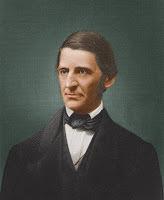 The unified oneness of the perceiver, that which is perceived, and the process of perceiving is an elusive oneness, even for Emerson. He admits the frustration at his fleeting glimpses of that which he does not eternally own. "A man can only speak, so long as he does not feel his speech to be partial and inadequate." We intuit the whole within the part, yet lose the wholeness within the boundaries. This fleeting, intuitive, deja vu-like experience of knowing wholeness is our experience with nature. We have been one with nature before, haven't we? We almost remember it. "There is throughout nature, something that leads us on and on, but arrives nowhere, keeps no faith with us." Our hunger, even when we eat, is for something greater than the physical food. All thoughts and exertions fall short because they are expressions of boundaries which limit the unboundedness that teases us with reminisces with every hard line and definitive action. "This disappointment is felt in every landscape." We cannot come "near enough" to the objects of our perception. "The pine tree, the river, the bank of flowers before [the poet], does not seem to be nature. Nature is elsewhere."
The unified oneness of the perceiver, that which is perceived, and the process of perceiving is an elusive oneness, even for Emerson. He admits the frustration at his fleeting glimpses of that which he does not eternally own. "A man can only speak, so long as he does not feel his speech to be partial and inadequate." We intuit the whole within the part, yet lose the wholeness within the boundaries. This fleeting, intuitive, deja vu-like experience of knowing wholeness is our experience with nature. We have been one with nature before, haven't we? We almost remember it. "There is throughout nature, something that leads us on and on, but arrives nowhere, keeps no faith with us." Our hunger, even when we eat, is for something greater than the physical food. All thoughts and exertions fall short because they are expressions of boundaries which limit the unboundedness that teases us with reminisces with every hard line and definitive action. "This disappointment is felt in every landscape." We cannot come "near enough" to the objects of our perception. "The pine tree, the river, the bank of flowers before [the poet], does not seem to be nature. Nature is elsewhere."What is fickle is not nature, not matter and motion; nature is not petulant, nor are we "tickled trout." It is our individual consciousness that is fickle and variable. "We cannot bandy words with nature, or deal with her as we deal with persons." There is no personal or individual relationship with nature, only a cosmic relationship. If we wish to see nature in its wholeness, then we must be whole. Our knowledge of existence is structured in our own consciousness. We cannot experience unboundedness while being bound by our own individual limitations. "Nature cannot be cheated," or tricked into revelation, Emerson writes. "Man's life is but seventy salads long, grow they swift or grow they slow." What we perceive through unenlightened eyes is only a glimmer of full sunlight. "The reality is more excellent than the report."
Emerson provides us with hope, though, even though he provides us with no clear technique for transcendence. Transcendence is our nature, after all. "The world is mind precipitated, and the volatile essence is forever escaping again into the state of free thought." Consciousness makes "the whole and the particle its equal channel." Since nature is in every particle of our existence and in all of existence, we should hope and live for that transcendental unity. "Every moment instructs and every object: for wisdom is infused into every form." We must strive for unity with nature, no matter how many days it takes.
"It has been poured into us as blood; it convulsed us as pain; it slid into us as pleasure; it enveloped us in dull, melancholy days, or in days of cheerful labor; we did not guess its essence, until after a long time."
The irony of Emerson's conclusion is that being nature, we yearn to know our nature, to live fully our unbounded nature, even if our individual, bound selves are too busy or preoccupied to remember. Being out among the trees can help us remember, though. That's why I'm camping right now, surrounding myself with nature, with trees and sky and lake. Ideas of enlightenment and unity reside in our mind, but also "stand around us in nature forever embodied, a present sanity to expose and cure the insanity of men." I'm here for the cure, even if it doesn't happen until after a long time.

Enter your email address:
Delivered by FeedBurner

October 8, 2020
3 Quick But Important Takeaways on the Pence-Harris Debate
 Having watched last night's Vice-Presidential debate between Mike Pence and Kamala Harris and then read commentary on the debate, my initial reaction was the same as journalist and columnist David French from Twitter: "I'm feeling nostalgic. This reminds me of normal debate frustration -- when politicians don't answer good questions and respond with canned mini-speeches. Simpler times."
Having watched last night's Vice-Presidential debate between Mike Pence and Kamala Harris and then read commentary on the debate, my initial reaction was the same as journalist and columnist David French from Twitter: "I'm feeling nostalgic. This reminds me of normal debate frustration -- when politicians don't answer good questions and respond with canned mini-speeches. Simpler times."However, after listening to the debate, thinking about the candidate responses, and reading some commentaries, three points stand out for me regarding the debate and what the candidates said, either verbally or with body language. I think these points will have major negative consequences from various segments of the voting population for the Republican Party. I think these negative consequences will be cementing blocks of voters to vote for the Biden-Harris ticket, even though Pence's steady calmness will reassure some voters.
Lies
Pete Buttigieg said on the Steve Corbert after-debate show (at 5 minutes in), "The scary thing is [Mike Pence] is pretty comfortable telling a total lie in a calm, reassuring voice that would make you think that what he was saying was God's honest truth." I think voters will realize that Pence's gift to the Trump-Pence ticket is his ability to calmly state lies that Trump . . . well, trumpets. Pence's denunciation of Harris for saying she wouldn't accept Trump's word that a vaccine for COVID-19 was ready but would also need verification by science is just one example. Pence sidestepped the point--not that science doesn't work, but that Trump is a liar. Another Pence moment related to this: "I think the American people know that this [Trump] is a president who has put the health of America first."
Mansplaining
Pence's calm, deliberate delivery worked against him when he attempted to "mansplain" his perspective to Harris and the American people. In a Time magazine piece, "Mike Pence’s Vice Presidential Debate Lecture to Kamala Harris Isn’t Likely to Help Trump With Women," both candidates are called out for side-stepping issues in their answers, but the article notes that Pence's overspeaking and extending his speaking time (and ignoring the moderator, Susan Page), his facial expressions, what he said produced a sense of "condescension and contempt," according to the article's author, Philip Elliott, whose comments in the article about the Trump-Pence ticket's problems with women voters is explained. Another article bashing Pence's behavior and how it will adversely affect the voting of women was The Hollywood Reporter, yes, in an over-stated style that nevertheless made a telling point.
"Pence appeared obnoxious, condescending and not altogether present in the moment as he ran roughshod over the two women on the stage and kept addressing issues the moderator had moved on from. If Trump did his best to get his picture under the definition of 'alpha male' in the dictionary last week, Pence’s portrait might be found under 'mansplainer.'”
Calm Pence/Angry Trump
The literary term is "foil," a foil being a character in a story that highlights through contrast another character's personality traits and behavior. Pence's deliberate calmness ultimately accentuates Trump's volatility. As Pence spoke about how much Trump cared for the American people, the president had just spent a day tweeting about how pandemic relief was on . . . and off . . . and on--until the obvious truth was seen that no matter what the White House and Vice President thought was happening, it could change in a moment, based on the president's mood. And many are tired of that volatility, senior citizens among them. Retirees in Florida are a good gauge of that fatigue, as seen in articles on the subject.
"He does not seem to care for truth. Truth is very important to me. He does not check facts," one retired man said. Another Florida retiree said, "They’re concerned about his plans for Medicare and social security of course, but they also didn’t allow their children to behave like this, they don’t allow their grandchildren to behave like this, and they’re very much turned off by it." In a Christian Science Monitor article, another retired voter says, "I’ve never seen this level of mishandling my entire life, and I was around during Richard Nixon and Watergate. This coronavirus situation has just highlighted how inept [President Trump] is."
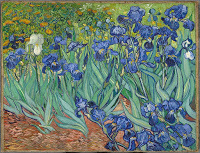 Irises, Vincent Van GoghUltimately, Pence's delivery style in the debate only serves as a foil to Trump's volatility. His demeanor is like the one white iris in Van Gogh's field of purple irises--the one white iris accentuates the saturation of the purple flowers. As we head into the home stretch of the 2020 election, Pence's one debate with his steady demeanor will only emphasize the stormfront of Trump's behavior--and folks are tired of the needless sound and fury.
Irises, Vincent Van GoghUltimately, Pence's delivery style in the debate only serves as a foil to Trump's volatility. His demeanor is like the one white iris in Van Gogh's field of purple irises--the one white iris accentuates the saturation of the purple flowers. As we head into the home stretch of the 2020 election, Pence's one debate with his steady demeanor will only emphasize the stormfront of Trump's behavior--and folks are tired of the needless sound and fury.People will hear and see what they want to, according to their point of view. After four years of White House lies, intolerance, and a stormy president, one solitary debate where the vice president calmly lies, is serenely intolerant, and who denies with wide eyes the storm raging outside--one debate, I sincerely hope, will not change the tide pulling us toward a more sane and civil time. As a final note, as usual, NPR provides an objective, balanced summary of the debate: "4 Takeaways From The Mike Pence, Kamala Harris Vice Presidential Debate." "The vice presidential debate wasn't likely to change many voters' minds or shift the trajectory of the race, but it showed sharp contrasts between the two parties' agendas for the economy, health care and more." Let's hope for a time of more informative reads and fewer diatribes.

Enter your email address:
Delivered by FeedBurner

September 26, 2020
Don't Expect Same Night Election Results
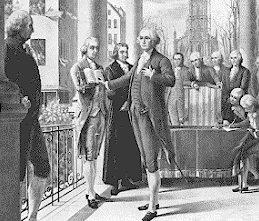 G. Washington, 1789
G. Washington, 1789 (National Archives)
I remember clearly staying up late on election night, watching election coverage and waiting for the winner to be announced--even though a news network's prediction was in reality unofficial. That probably won't happen in the November 2020 election, and voters need to understand that and be okay with waiting for election results . . . possibly for weeks or longer.
It helps to know that historically, during times when hand-counted ballots and snail mail were the norms, that gathering national election results took time. It used to be that the president was not installed in office until March, until in 1937 (and thereafter) when presidents were installed in January. The 20th Amendment to the Constitution, the "Lame Duck" amendment, upped the inauguration day to speed up the transition to office, something needed and possible in the more technological age but which would have been difficult in older times when communications and travel were slower.
I recently read an article speculating various scenarios of a contested 2020 election, published by the Harvard Gazette, in which I was able to glean the one sentence of historical fact that I was looking for: "For many times in our history, we didn’t know the result of state tallies for weeks, so that’s not historically unprecedented." I wasn't motivated to fall under the spell of gloom-and-doom scenarios the article speculated, but I was interested in the idea that for most of the history of the United States, there were no election night instant results. Voters understood that there would be a time lag between the voting, the vote count, the results announced, and the inauguration. These things took time . . . and still do.
I also found it interesting that the idea of secret voting came about mostly after the Civil War because of the intensity and violence of that conflict. Before that, voting was more public, even including voice votes and adding your signature to a list for a candidate--sometimes during fairs or carnivals where folks (men, who voted then) could be inebriated. It seems voting is more solemn now, probably a good thing, not just something done between horse races.
The Wall Street Journal has posted an article online, "When Will We Know the 2020 Presidential Election Results? A Guide to Possible Delays," that seems to fairly objectively discuss the idea of delayed results for the 2020 presidential election. The journal's main point is that mail-in ballots will take longer to count, that we should expect that, and that we should be patient.
“We have to prepare for the very strong probability that an election unlike any other we’ve ever had might take a little longer to accurately count with integrity,” said David Becker, executive director and founder of the nonpartisan Center for Election Innovation & Research, a group in Washington, D.C., that works to improve election administration. “More time being taken to report results is not an indication of a problem.”
We are reminded that election night results are unofficial and that it often takes weeks for the official tally to be announced. In a close race, it is even more important that the certification process be accurate, which may increase the time lag.
Emotions are high for many, and some politicians are doing their best to inflame those passions. I think it's ironic--and good--that Americans need to realize that our patriotic duty in the upcoming election is to vote . . . and then chill. Don't listen to screamers and accusers. Let the process follow its course as it has done so for over two hundred years. Step back from that need for an instant information fix. Be patriotic. Just chill.

September 15, 2020
Down with Doomscrolling!
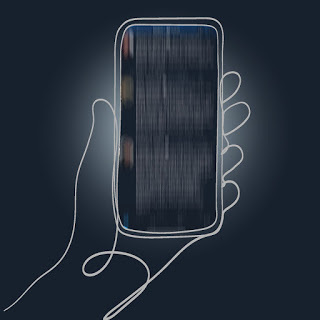 "Doomscrolling" and "doomsurfing" are new compound words Merriam-Webster is watching, "referring to the tendency to continue to surf or scroll through bad news, even though that news is saddening, disheartening, or depressing. Many people are finding themselves reading continuously bad news about COVID-19 without the ability to stop or step back." The "scrolling" compound highlights the use of the smartphone for skimming for bad news, the "surfing" referencing computer use, although the terms are pretty much interchangeable.
"Doomscrolling" and "doomsurfing" are new compound words Merriam-Webster is watching, "referring to the tendency to continue to surf or scroll through bad news, even though that news is saddening, disheartening, or depressing. Many people are finding themselves reading continuously bad news about COVID-19 without the ability to stop or step back." The "scrolling" compound highlights the use of the smartphone for skimming for bad news, the "surfing" referencing computer use, although the terms are pretty much interchangeable. And I am guilty of engaging in this activity. Guilty, guilty, guilty.
"Can you think of a better way to spend your time?" Merriam-Webster asks, adding, "Remember to take some time away from your phone today." Yes! As one friend said to me six months ago: "It's bad enough to let this virus into your body, much less your mind." Merriam-Webster continues to provide wise insight.
During times of crisis and uncertainty, some of us pay more attention to the news, looking for answers. And this might not surprise you, but we have to say it: a lot of the news is bad. And yet we keep scrolling, keep reading article after article, unable to turn away from information that depresses us.
Our friendly neighborhood dictionary provided some emotional support at the end of this "Words We're Watching" entry: "Whether you prefer to surf or scroll for your doom, don’t feel you need to take it in all at once. After all, tomorrow is another day."
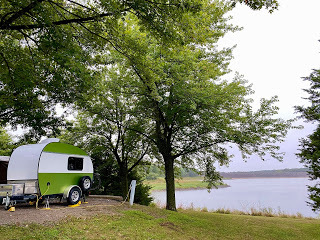 Rathbun Lake
Rathbun Lake
I was curious to see what strategies others have suggested to cut doomscrolling out of our day. And, yes, I went online to find out, but with a focus! In fact, here is my pre-research list of what I think I'll find, written down because this whole process--article and research--is really a bit of self-therapy to re-balance myself and to re-structure a more positive activity level for myself. It's part of my current two-week camping sojourn at local state park. Change of view, change of pace, and screw my head back on.
Health.com published a comprehensive article about doomscrolling: what it is, why it's bad, and how to stop. "Turns out your brain loves this stuff," a psychiatrist says, the ancient negatives like dodging saber tooth tigers has been replaced by more pervasive, insidious negatives that just hang on and on. The article's suggestions? First admit that you engage in the behavior and that it has a negative effect. Next, set a daily time limit (15 minutes a day, the article suggests). Finally, train yourself to identify positive events in your life and around you. (Find three positives a day, the article suggests.)
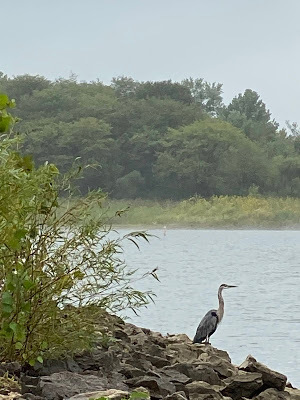
What I found interesting and useful about both articles is the mention of having a plan. Negativity can be like quicksand; the ground looks stable, but suddenly you're stuck and being pulled down. Plan to stay on higher, firmer ground. Create a habit of engaging in positive activities. I think my two-week "staycation" here on the lake is paying off: reading, writing, cooking, hiking and bicycling, and having a plan to limit my news intake. Hiking rather than scrolling! In fact, now that I've finished this article, I think I'll see what my neighborhood heron is up to. Wash your hands, wear a mask, and maintain social distancing to keep your body healthy . . . and, you know, the mental equivalent for those three measures ain't so bad either. Keep to positive online material, filter your internet activity, and distance yourself from your phone.
Well, okay, for me it is literally a new dawn on the lake, and I'm looking forward to this new day.

Enter your email address:
Delivered by FeedBurner

August 17, 2020
Step-by-Step, I Get My Main-in Ballot for the 2020 General Election and Submit It
For the primary election, the Iowa secretary of state sent out ballot requests to all registered Iowa voters in order to make voting by mail easier and, therefore, safer because of our current coronavirus crisis. Two situations arose from this action by the secretary of state: 1) I didn't receive my request, and 2) our Iowa state legislature got huffed and passed legislation to make the mail-in process more difficult to facilitate, especially for county auditors.
Iowa Secretary of State Paul Pate did send out mail-in request forms to Iowans, but my wife and I did not receive the forms. Via Facebook and a voting-savvy friend, my wife and I were able to download and print request forms, fill them out, and return them so that we could vote safely without crowding up the voting stations.
As the November election nears, concerns have also been voiced about possible delays in the U.S. Postal Service's mail pick-up and deliveries, prompting possible late delivery of mail-in ballots, which would cause those ballots to not be counted.
Therefore, it's best to secure your mail-in ballot early and to do everything you can to ensure that the ballot is delivered on time, whether by mail or by handing in your ballot to your local county auditor. Here are the procedures I'm currently following, and those I plan to utilize once I receive my ballot, in order to ensure that my vote counts.
I searched online and found the "State of Iowa Official Absentee Ballot Request Form," the mail-in ballot request form. My wife and I ran off the forms and filled them out, being sure we didn't transpose any numbers or create any situation where the forms might not be considered completed. If we didn't have a printer, we could have gone to the county courthouse and received a ballot request from the auditor's office.I called the auditor's office and asked when the ballot request forms could be submitted, and the auditor is currently accepting request forms. I filled out the request form, donned my covid mask, grabbed my hand sanitizer, and delivered my request to the Jefferson County Courthouse auditor's office. The request form can be mailed to the following address: Auditor's Office, Jefferson County Courthouse, 51 W. Briggs Ave., Fairfield, IA 52556.Our county auditor clerk said the last date the auditor can receive the ballot request form is October 24, by 5:00 PM. General election main-in ballots must be postmarked by November 2 and received by November 9, 12:00 PM.Mail-in ballots can be submitted by hand any time up through 9:00 PM on election day.My wife and I plan to fill out the ballot soon after receiving it, and then I will mask up and deliver it in person to the county auditor's office. That way, the only mail interaction will be the delivery of the ballot. Here is an article about other options than mailing in your absentee ballot: Absentee Ballot Submission Options.

Enter your email address:
Delivered by FeedBurner

July 26, 2020
Negotiating the Danger of Fools and Their COVID-19 Folly
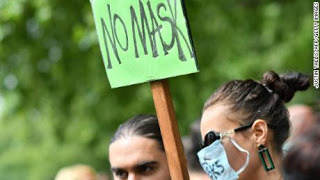 "Sweetie, don't get too close to the lady," I say to my granddaughter at the swimming beach of our local lake. "Give her some space."
"Sweetie, don't get too close to the lady," I say to my granddaughter at the swimming beach of our local lake. "Give her some space."As my granddaughter stops and backs away in water that's waist deep for her, the lady says, "Oh, that's not important to me."
"Well, it's important to me," I respond.
The lady leaves the pond, and as she exits the pond, she grimaces and mutters, "I think it's just ridiculous."
It's a hot summer late morning, and my wife and I have taken the kids to swim. Few people are there, only an elderly man (maybe a bit older than me) and another grandmother and her two grandkids. The other grandmother is sitting in the shade maybe thirty or forty feet from the water. She never says a word to her two grandkids, whom we have to remind, along with our own grandkids, to keep our separate family spaces apart. The elderly gentleman has a touch of what used to be called "feeble-mindedness," and I have to clearly ask him to keep his distance as he leaves the water.
So, yeah, I'm thinking about the situation and how I answered, and with a bit of research come up with a Biblical reference from Proverbs: "Do not answer a fool according to his folly, lest you also be like him. Answer a fool as his folly deserves, lest he be wise in his own eyes" (26:4-5).
That's quite a mouthful, yet I think the main idea is that debating ignorance on its own level is not only a futile exercise, it also legitimizes the foolish idea or action. From that perspective, I think my response was appropriate. I stated my perspective in a way that motivated the response I desired--without trying to argue the individuals out of their mindset. I didn't accept their viewpoint; I just established that I would prefer that they keep their opinions over there.
As I write this, the United States will soon have four and a quarter million confirmed cases of COVID-19, 150,000 deaths, and has several states seriously under siege and in danger of being overwhelmed by the new coronavirus. "What will it take to convince people that the pandemic is real, that there is real danger?" I ask myself. Here I am at the beach on a Saturday morning for an hour and a half, and I have to interact with three individuals who foolishly are disregarding the fact that the world is experiencing a pandemic.
 Being an admirer of the Age of Reason, the era that birthed our United States of America, I think of Benjamin Franklin and his Poor Richard's Almanack. “Experience keeps a dear school, but fools will learn in no other, and scarce in that.” The United States, along with the rest of the world, is in the midst of dealing with the "dear school" or hard-knocks school of a viral epidemic, yet because the virus is invisible and for many Americans the effects of the virus are not sitting on their doorsteps, they scoff at the pandemic and its dangers, to circle back to the Biblical reference.
Being an admirer of the Age of Reason, the era that birthed our United States of America, I think of Benjamin Franklin and his Poor Richard's Almanack. “Experience keeps a dear school, but fools will learn in no other, and scarce in that.” The United States, along with the rest of the world, is in the midst of dealing with the "dear school" or hard-knocks school of a viral epidemic, yet because the virus is invisible and for many Americans the effects of the virus are not sitting on their doorsteps, they scoff at the pandemic and its dangers, to circle back to the Biblical reference.Negotiating the pandemic deniers is one of the greatest dangers during this time. Arguing with the deniers is a danger that has resulted in some deniers invading the personal space of others to breathe or spit on them, or to even attack. Another Biblical quote, reads "For ye suffer fools gladly, seeing ye yourselves are wise" (2 Corinthians 11:19). To paraphrase, if we consider ourselves "in the know," then we should be kind and patient with those who are engaged in unwise thinking and action.
There is the flip side to this saying though, that we should "not kindly suffer fools," that we should not put up with the dull and dangerous thinking of others. Such behavior, though, can be its own expression of the ignorance of arrogance and excessive pride, of belligerence born narrow-mindedness. Thinking about this pandemic, it seems some push-back is necessary to keep a safe space around ourselves. The question for me as a private citizen, an individual, is how do we keep ourselves safe without provoking covid fools to get into our faces? How do we allow ourselves and others our personal freedom without giving this novel coronavirus the freedom to spread?
As a private citizen, I think my course is to be clear in my expectations of others without being confrontational. I am not trying to separate fools from their folly; I am trying to separate myself from the fools. Looking back at my actions at the beach, I think I did an okay job. For the woman who thought social distancing ridiculous, I didn't ask her to change her opinion, only to respect mine. For the grandmother who just let her grandkids play without providing social distancing guidance and intervention, my wife and I just kindly reminded the kids to each keep to their own areas. For the older gentleman who wanted to come up close and talk to me, I asked him to keep his distance in as neutral a manner as possible, turning my shoulder and breaking eye contact. All three strategies worked.
The problem is that each of those three situations could have been dismal, disastrous fails. The woman who felt the whole thing ridiculous could have ignored me and hugged my granddaughter, or could have charged over to me to scream in my face. The kids (including my own grandchildren) could have ignored our instructions, being at an impulsive age, and just gotten together. (This, of course, is one of the biggest fears of teachers as the beginning of the school year is approaching.) The elderly gentleman could have just not understood my request that he keep his distance, just a nice old guy navigating the fog of his latter years. I could have been occupying the covid reef he crashed upon.
None of those worst-case scenarios occurred, but they could have. I was reminded that going out in public during these times is a risk. We are all trying to balance our need for the freedom to get out with our need to keep safe during this pandemic. What risk level can we tolerate, and what risk level is prudent, not only for ourselves but for society, is the question of questions. We must find a way to kindly suffer fools yet to find a way to be "kindly unkind" and clearly indicate what behaviors are dangerous and unacceptable. As the governor of Wisconsin said last May, "We are the Wild West." Just as in the frontier days, an element of self-sufficiency, clear-headedness, and realistic thinking is required of all of us if we and our families are to remain healthy. The police and civil law can't protect us if someone invades our personal space and infects us with this novel coronavirus. It's already too late.
Yes, people in some cases and places are breaking civil law, but the big deal is that so many are breaking the laws of nature. People may get away with breaking a government's law, but the laws of nature are implacable when it comes to retribution. Hunker down, run, yell--do what you must, but do not get between fools and their folly. And for God's sake, do not become infected with their folly.
 Enter your email address:
Enter your email address:Delivered by FeedBurner

July 12, 2020
Three Angles for Writing a Travel Article
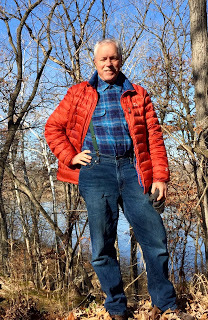 I've been thinking about my camping blog, Green Goddess Glamping. During the camping season, I write about the places I travel to, about my experiences out and about in my tiny camper. Because of the COVID-19 pandemic, though, I'm not out and about so much, and when I am camping, it's been to sites close by, places I've camped at before. As a writer, does this create a dilemma? Since I've already written about a particular lake or campground, then what more is there to say?
I've been thinking about my camping blog, Green Goddess Glamping. During the camping season, I write about the places I travel to, about my experiences out and about in my tiny camper. Because of the COVID-19 pandemic, though, I'm not out and about so much, and when I am camping, it's been to sites close by, places I've camped at before. As a writer, does this create a dilemma? Since I've already written about a particular lake or campground, then what more is there to say?I'll be traveling to a nearby state park tomorrow, Lake Darling State Park, in SE Iowa. I've written several times about camping at Lake Darling, both as a tiny trailer camper and as a bicycle camper. I've described hikes, bike rides, the campground, cooking, the weather, sunsets . . . all the fun my wife and I have fun there. What more to write?
What occurred to me was that any experience has three aspects or "angles" of approach by a writer, the writer's personal experience, the dynamics of the experience, and the geography of the experience. I've heard this described as the perceiver , the process perception, and the object of perception. This means I can write about any destination from any one or more of those three angles. I don't have to just write about my drive, setting up camp, and what I did. I have more options, and looking through past articles in Green Goddess Glamping, I can see examples of where I have already focused my writing on one aspect of this "three-in-one" reality of experience.
The Writer
When I arrive at a campsite, especially when I camp alone, sometimes the inner landscape of the mind melds with the outer natural beauty of the river or lake, the woods. Sometimes this leads to insights which I share in my articles.
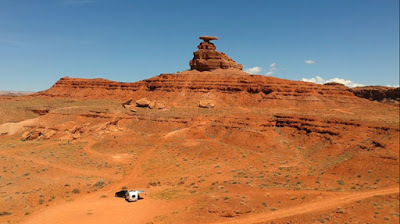 Photo by Mark Busha, tiny trailer camper, in a remote location in Utah
Photo by Mark Busha, tiny trailer camper, in a remote location in UtahOne good example is my article about how being alone doesn't mean one is lonely, that solitude is not synonymous with loneliness. In "Traveling Solo: Being Alone Is Not the Same Thing As Being Lonely," which I wrote while camping, I focused on my inner experience while out camping. I wrote about how camping in nature can lead not to a sense of loneliness and isolation but rather to an experience of connectedness and integration.
The Process
Sometimes the process of camping dominates; perhaps it dominates most of the time if we let it. Towing the trailer, backing the trailer, setting up camp, and camping out provide many opportunities for writing. My "How-To" and "Reviews" tab links are filled with articles that relate to the process of camping, everything from how to stabilize the trailer to campfire cooking. Articles about equipment, how it works and how well it works are always popular and fun to write about.
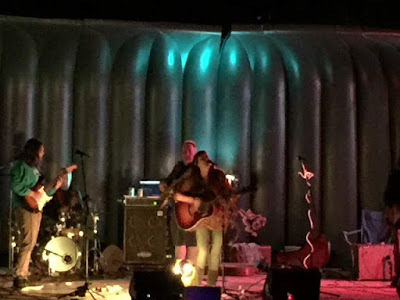 Jomeokee Park, North Carolina
Jomeokee Park, North CarolinaWhen I write about the process of camping, there is always that journaling aspect: I did this and then that. Photographs fit into the narrative, which adds to the enjoyment of the camping experience. Many of my camping blogs are about the Green Goddess Expeditions. Since the Green Goddess is my first camper, many of my articles have been about what I needed to learn in order to enjoy the trailer camping experience. One good example of a narrative of a camping weekend is my article "Unknowingly, I Tiny-Trailer Camp-Crash Woodstock," where I wrote about stopping for a quiet weekend at a private campground while traveling the Carolinas, and then discovering that a private camping group had organized a music concert for the weekend. A fun experience!
The Subject
We show up to a campground for a few days, but the land has its reality outside our experience, it has its geography, its biology, its history. That is a subject for experiencing and writing about that is a source of great possibility. The more times I camp at a particular place, the more I learn about that place.
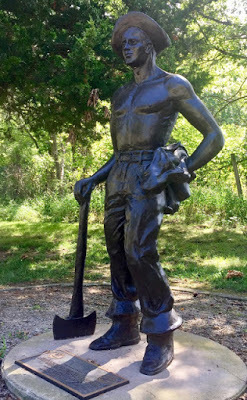 Statue at the west entrance to Lacey-Keosauqua
Statue at the west entrance to Lacey-KeosauquaLacey-Keosauqua State Park is a good example of experiencing a particular place. My wife and I have camped there many times, and I have quite a few articles about our "expeditions" there. As time passes and the number of visits to a campground add up, I think the experience becomes more "vertical" than "horizontal." We go deeper into a place and learn its secrets, something I wrote about in the article "It's Not Just How Many Miles or Places." Delving into the details can be a joy. What specific variety of oak is that? What variety of goldenrod? And since I'm writing during the Midwest summer: What exactly is a "chigger"?
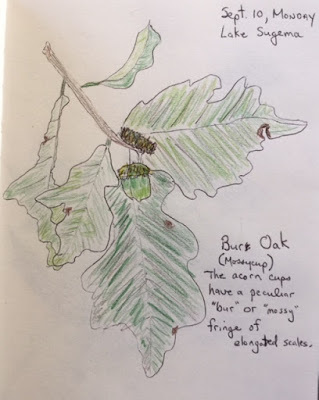 Bur oak sketch
Bur oak sketchThe three-in-one reality of knower, process of knowing, and known don't take place one at a time; there is no separation--one including all. As a writer (and a student of nature), I can focus on one attribute of my experience, though. It expands my ability to understand and express my experience. It focuses my intellect.
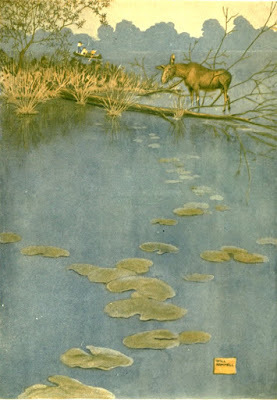 From the Gutenberg e-book
From the Gutenberg e-bookIn Henry David Thoreau's narrative Canoeing in the Wilderness , he shifts seamlessly from his own personal experience to the process of canoeing to the beauty of the woods and river. He writes with growing awareness during the book of how he, even though an experienced naturalist, is not as knowledgeable in the woods as his American Indian guide Joseph Polis. Thoreau creates an enjoyable read as he narrates his experiences of canoeing the river rapids and the turbulent lakes in Maine. He writes about setting up camp and how his guide knows just the right place to be not too far from the river yet still dry and relatively free of mosquitoes. The physical environment is described with great regard and attention to detail, as seen in this passage describing canoeing down a branch of Webster Stream.
"As the shores became flatter with frequent sandbars, and the stream more winding in the lower land near the lake, elms and ash trees made their appearance; also the wild yellow lily, some of whose bulbs I collected for a soup. On some ridges the burnt land extended as far as the lake. This was a very beautiful lake, two or three miles long, with high mountains on the southwest side. The morning was a bright one, and perfectly still, the lake as smooth as glass, we making the only ripple as we[152] paddled into it. The dark mountains about it were seen through a glaucous mist, and the white stems of canoe birches mingled with the other woods around it. The thrush sang on the distant shore, and the laugh of some loons, sporting in a concealed western bay, as if inspired by the morning, came distinct over the lake to us."Whether as a camper or as a writer, whether on an expedition into the Maine woods in 1857 or on a weekday romp to the local state park, we can all be explorers of the three-in-one nature of life. We can have our inner selves up uplifted, we can enjoy the dynamism of our activity, and we can appreciate the rich beauty of our world. So this has been a small update from me: I'll be out there somewhere close to home, safely enjoying the richness of life, writing about how to make it even richer.
 Enter your email address:
Enter your email address:Delivered by FeedBurner

July 3, 2020
Pathfinding the COVID-19 Wilderness
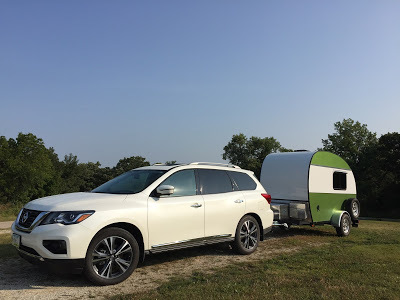
The joke here is that I own a Nissan Pathfinder, which is also the tow vehicle for my tiny camping trailer, the Green Goddess. The idea of finding the safe path to take during this coronavirus pandemic is no joke, though, and I'm not just talking about the dangers of catching or transmitting the virus. What is important is not just being physically safe but also finding a way to live a full and fruitful life during dangerous times. I'm finding three challenges to living a fulfilling life in our current times: physical, mental, and governmental.
The Physical Environment
 Let's face it: our physical environment is more dangerous now, and we'll be living in this more dangerous environment for a long time, maybe even for the rest of our lives. Times have changed. I wrote about some of those lifestyle changes in my last post, which I wrote about a month ago. That much time passing between posts is a surprise, but I guess I've been focusing on my new, "ramped up" old routine.
Let's face it: our physical environment is more dangerous now, and we'll be living in this more dangerous environment for a long time, maybe even for the rest of our lives. Times have changed. I wrote about some of those lifestyle changes in my last post, which I wrote about a month ago. That much time passing between posts is a surprise, but I guess I've been focusing on my new, "ramped up" old routine.It is like pathfinding, though, through a dangerous wilderness. Even while bicycle riding to the library, which only has curbside delivery now, with book browsing via the online catalog, I have to leave home only after checking whether I have a mask (which I don't wear while riding but have handy) and whether I have sanitizing spray. I am prepared to kindly ask others to keep their safe distance. Entering stores is an even more dangerous excursion into the "deepest, darkest wilderness." Sometimes when entering a store, I feel like Frodo and Samwise in The Lord of the Rings as they enter Shelob's lair. This coronavirus is invisible yet still dangerous. It's out there somewhere--in the air, on some surface, but where? I enter a store mindful of surfaces, air flow, other shoppers. Sometimes I don't enter or I just poke my head in and then leave.
A Balanced Inner Life
Negotiating the physical environment during a pandemic is just one aspect of living one's life. There's the physical and then there's the mental. My wife and I are dealing with all those issues everyone else is also dealing with--cabin fever, the sense of life being restricted, the awareness of danger to ourselves and to our loved ones. Emotional claustrophobia.
A main way we maintain a balanced inner life is by continuing our practice of the Transcendental Meditation technique. We've been doing this technique for many years, and since it's safe to sit quietly and close our eyes at home, we have our entire inner selves to experience, safely and enjoyably. This is a great boon. And the deep rest the technique provides the body also strengthens our immune systems.
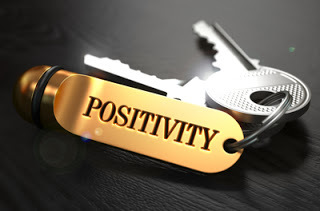 Since I'm retired and my wife works her consulting business at home, we haven't had to deal with environmental dangers like folks who are still working out in the community. Beyond engaging in those physical safety measures while at the grocery store or the farm store, our challenge is that we are always at home--cabin fever. We're exploring local camping with our tiny trailer, which opens our horizons, but we're also taking time to honor our individual lives. We've recently bought a second car so we each "have our own." This is, of course, not a matter of legality but just a sense of identification. We had two cars for many years, but when we both found ourselves more at home, me having retired and my wife starting her own business, then we sold one car. With two cars again, I can travel and camp locally, and my wife and I can both enjoy some individual time alone, or she can come and visit, or I can drop in at home for the day. Having two cars is both an actual opening of possibilities and a symbolic recognition that we both have individual lives, the cars expanding and enriching both personal time and shared time.
Since I'm retired and my wife works her consulting business at home, we haven't had to deal with environmental dangers like folks who are still working out in the community. Beyond engaging in those physical safety measures while at the grocery store or the farm store, our challenge is that we are always at home--cabin fever. We're exploring local camping with our tiny trailer, which opens our horizons, but we're also taking time to honor our individual lives. We've recently bought a second car so we each "have our own." This is, of course, not a matter of legality but just a sense of identification. We had two cars for many years, but when we both found ourselves more at home, me having retired and my wife starting her own business, then we sold one car. With two cars again, I can travel and camp locally, and my wife and I can both enjoy some individual time alone, or she can come and visit, or I can drop in at home for the day. Having two cars is both an actual opening of possibilities and a symbolic recognition that we both have individual lives, the cars expanding and enriching both personal time and shared time.It's odd but true that travel now--even across the road to chat with a neighbor--involves much more psychological gravitas. My wife and I are finding ways to safely "open up" our lives, both individually and together, in ways that fulfill our need to both be together sometimes and alone sometimes. How typically American my wife and I are that finding a balance in life, finding emotional safety, includes buying a car! The irony on top of the irony is that buying a second car wasn't just an emotional gesture. It really does increase safe opportunities to explore our individual lives and our life together.
The Government Conundrum
A conundrum is a "confusing and difficult problem or question." How our government is dealing with COVID-19 is certainly an uncertain landscape to find a safe path through. I suppose it has always been the reality that government actions affect our lives--but now government actions glaringly affect our lives . . . and deaths--130,000 American lives as I write this. One governor called the pandemic experience the Wild West, and I get it. Since the response of the federal government for the most part has been too little, too late, and since many states (all but two of the fifty, by my reading) have opened up too early, there is that sense of living the frontier life, out there on our own and having to be self-reliant. It's like pathfinding through a bog or swamp. We have to be careful where we step because the land may look firm but may suck us under.
We have to be self-reliant and look out for ourselves and our loved ones as best we can. Physical and mental dangers are increased, though, due to the insufficient and inept (and sometimes insane) response of the government to this pandemic. It's as if our neighbor has a vicious dog and lets it run loose. The city responds--or says it has--yet somehow the dog is still running loose. Okay, we've made the phone call, but the dog's still out there, pacing and growling. We have to recognize the reality. Unfortunately, for whatever psychological reasons, many people are not recognizing that the dog's still outside our front doors, growling and waiting for us to come out. And the government's commentary is making the situation worse. That, in my opinion, is true for the federal government and for my state of Iowa. Iowa isn't lowering the curve of infections; it's just behind the curve of other states.
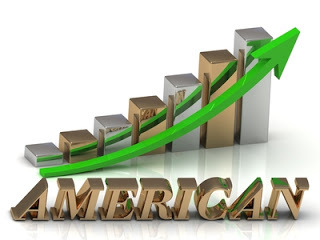
Finally, I'm tempted to say, "Americans have had it too easy, so easy that they can't accept that they're in danger. They can't set aside politics and their personal banner issues in order to deal with the pandemic." It's just not true, though. Too many Americans don't have it too easy and already were in danger even before the pandemic. I don't know why we as Americans don't have the unified vision to work together to deal with our challenges--other than the fact that we just don't have the unified consciousness now. My wife and I and our families--that's a manageable unity for me, not necessarily a controllable reality, but one that is close enough to heart and home that I at least feel kinship with. My wife and together travel a wilderness; we choose and follow our path together. Sometimes we disagree on the exact path, but agree that we are traveling together. Our children follow somewhere behind . . . maybe. We are blazing a trail, though, and follow or not, they know our direction and course. The path has its dangers and its beauty. I am not alone, though, and for that I am grateful.
 Enter your email address:
Enter your email address:Delivered by FeedBurner

May 13, 2020
The New Pandemic Lifestyle Is the Old Lifestyle--Ramped Up
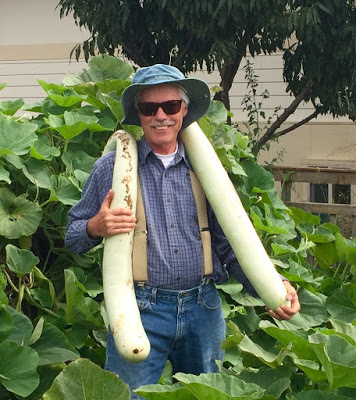 The basic reality is this: my federal and state governmental policies regarding the COVID-19 epidemic are driven by politics rather than medical science. My wife and I are in the higher risk category because of our age. No vaccine exists, and scientists are still trying to discover medicines that help lessen the impact of the virus if one is infected.
The basic reality is this: my federal and state governmental policies regarding the COVID-19 epidemic are driven by politics rather than medical science. My wife and I are in the higher risk category because of our age. No vaccine exists, and scientists are still trying to discover medicines that help lessen the impact of the virus if one is infected.The basic reality is that I'm living in a hostile environment. In my state of residence, Iowa, infections are still spiking even as the governor "opens" the state, even though she never really "closed" it. From April 20 to May 12, the state's confirmed coronavirus cases rose from 3,159 to 12,912, an increase of more than 300 percent in 22 days.
The basic question is this: How do I stay alive and healthy in this environment?
There is no quick solution to this pandemic, especially since state and federal governments are making decisions that ignore medical realities. Our current situation will last for years, probably--at least for my age group. I feel like a villager in the African savannah that has a thorn fence around the village. Lions prowl outside the fence, but still one has to leave the security of that barrier for water, for food, for taking care of the herds. My armor is not a warrior's spear, though. It's knowledge. Even during the good old days of just-plain-flu season, there were safety protocols. I have to continue with those--ramped up.
Stay home and limit my interactions with people outside my "safety bubble." Currently my wife and I only interact closely with our daughter's family--daughter and two grandchildren. We first quarantined for two weeks and now closely maintain our bubbles of safety, as best we can, going out for food as little as possible.Heightened awareness of safety protocols when in public. Going out to a store or business is not a casual act. I consider the need, and if there is a need, then I fulfill the task, using a mask and having an alcohol sanitizer spray bottle with me. I sanitize the car, all the places I touched, when arriving home. When packages arrive, we treat them as suspect. When a package arrives, we follow the advice that there is low risk that the package has been contaminated with the virus--but not zero risk. We remove the contents of the package, place the box outside, and then wash our hands.Long-term plans. Recognizing that our environment has changed, we are establishing long-term lifestyle habits. Masks and hand sanitizer when in public will most likely be a reality for at least the next couple of years. Social distancing will become a norm. When school begins again, we recognize that may impact our interactions with our extended family. Lacking specific information, we'll just have to wait and see. We are establishing a routine that will continue for a long time, and we are ready to modify that routine based on incoming information.Stress management. These are times of increased stress, so my wife and I make sure we communicate, get our rest, and regularly continue our lifelong practice of meditation. We have goals to limit our focus on the news. It's important to know what's going on, but it's also possible to spend too much time obsessing on repetitive, negative news. From my side, I need to get the news but not then read the ten additional stories, analyses, and opinions regarding that particular bit of news. Maintaining a healthy, positive routine. In our family, our positive routines over the years have included bicycling and hiking, gardening, camping, and cooking and eating healthy, natural foods. We believe we can maintain our healthy, positive lifestyle yet also maintain our safety protocols. Bicycling and hiking will still necessitate social distancing. Camping will be local. We'll cook at home and not hit the restaurants.We are always ultimately the ones responsible for our own lives. Especially in our current times when our federal and state governments are saying that there are more important issues than our individual lives, it's vital that we look to and plan for our own healthy future. There have always been lions outside the thorn barrier that surrounds the village. Those lions are more numerous now, and closer and more actively agressive.
Yesterday I turned in our mail-in ballot requests at our county courthouse. I did so safely, following all the protocols--mask, sanitizer, distancing, and don't touch your face. I know whom I'm voting for, and it won't be for candidates that consider me expendable. I plan to vote, but in the meantime, I've got a few fun and healthy activities to engage in. As Voltaire said in the last line of Candide, "That is all very well and good, but let us tend our gardens."
 Enter your email address:
Enter your email address:Delivered by FeedBurner




